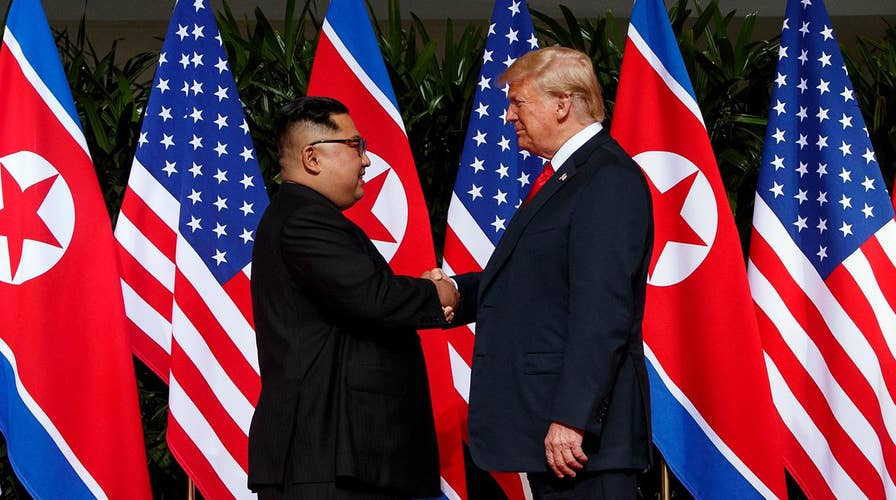Korea expert on the impact of Trump-Kim summit
Former Associated Press Pyongyang bureau chief Jean Lee shares insight on 'America's News HQ.'
When President Trump and Kim Jong Un grasped hands in Singapore last week, it signified the beginning of a relationship between leaders of the U.S. and North Korea that had been thought impossible for 65 years. Many commented that it was almost a surreal moment.
The historic Trump-Kim handshake and the dialogue that followed represented a promising first step forward – a step toward peace.
Relations with North Korea have troubled U.S. administrations of both political parties for decades. Bringing to pass this initial step toward a new era of peace and cooperation took strength and courage on our president’s part. I very much appreciate and applaud him for his leadership.
We should also not overlook the fact that millions of people were praying for this meeting and the leaders involved – Americans, North Koreans, South Koreans and others around the globe.
Peace between nations is fragile and many times requires taking risks. Throughout the Cold War, my father, Billy Graham, consistently denounced the godless communist system that was restricting the religious and economic freedoms of millions.
Yet in 1982 my father received an invitation to attend a “peace conference” on the topic of preventing nuclear catastrophe in, of all places, Moscow. The conference was not a distinctively Christian conference, and many people advised him not to go, fearing his presence would be used for propaganda purposes. However, after much prayer, my father did decide to go.
Peace among people of different cultures and views takes patience and work, but it’s worth it.
Ultimately, his participation opened the door to a new era of opportunity for the Gospel across the former Soviet Union. Less than a decade later, the Soviet Union itself collapsed. These historic outcomes might never have taken place if Billy Graham and others had not had the faith and vision to take a risk.
President George Washington – a great military general and war hero – said: “My first wish is to see this plague of mankind, war, banished from the Earth.” In other words, he was expressing his longing for lasting peace.
The Bible speaks of three kinds of peace.
The first is peace with God, which each of us needs because our sins have separated us from him and we deserve his wrath and judgment. “Having made peace through the blood of his cross” (Colossians 1:20), God then raised Christ from the dead. We have the eternal good news that “Therefore being justified by faith, we have peace with God through our Lord Jesus Christ” (Romans 5:1).
A second type of peace in the Bible is the peace God offers those who trust him in the daily trials of life. Jesus said to his followers: “Peace I leave with you; my peace I give to you. Not as the world gives do I give to you. Let not your hearts be troubled, neither let them be afraid” (John 14:27).
Millions of people across the globe are searching for peace that is greater than their regrets, their fears, their storms and their stresses. Recent studies have documented dramatic rising rates of loneliness, depression and suicide in our society. Christ alone offers peace that endures through the challenges of this world to all who call on him.
A third type of peace in the Bible is peace in our human relationships and between nations. This is the peace President Trump was seeking to further through the Singapore summit. Peace among people of different cultures and views takes patience and work, but it’s worth it.
Jesus said: “Blessed are the peacemakers, for they will be called children of God” (Matthew 5:9). While we are saved from our sins solely through faith in Christ alone, being willing to work for peace is consistent with his nature. He is, after all, the Prince of Peace.
We are instructed in God’s word to pray for those in authority, with the goal of peace “for kings and all who are in high positions, that we may lead a peaceful and quiet life” (1 Timothy 2:2). That should be a great motivation to pray for our leaders.
The human race does not have the capacity in itself to eliminate hatred and bloodshed totally, but as we have opportunities we should do all we can to promote peace, to “seek peace and pursue it” (1 Peter 3:11). It pleases God. It’s good for our nation. And it matters for our children and grandchildren.

